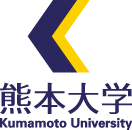- ホーム
- 講座
- 先端生命医療科学部門
- 呼吸器外科・乳腺外科学
スタッフ
| 教授 | 鈴木 実(呼吸器外科) smakoto(アットマーク)kumamoto-u.ac.jp |
|---|---|
| 准教授 | 池田 公英(呼吸器外科) |
| 助教 | 冨口 麻衣(乳腺外科) |
| 助教 | 松原 恵理(呼吸器外科) |
研究テーマ
【研究プロジェクト名および概要】
(呼吸器外科)
①肺癌、特に多発肺腺癌の発生に関わる遺伝子変異、多型の研究。近年高分解能CTの発達に伴い、肺野末梢の肺胞上皮置換性の増殖を示す小型肺腺癌の発見が 増加している。このような病変が肺野に多発している症例も多く、従来の肺癌と比較して女性、非喫煙者、東洋人に比較的多く、高率にEGFR遺伝子変異を認めることが知られている。このような 症例においてどのような遺伝的、あるいは環境的な要因が肺癌の発生に関与しているのかはよく わかっていない。現在われわれは、肺野末梢の肺胞上皮置換性増殖を示す肺腺癌、特に非喫煙者、 多発症例における遺伝的背景について研究を行っている。
②術後補助化学療法群における再発危険因子の解明と、抗癌剤感受性に関わる遺伝子変異およ び多型の研究。 今日、非小細胞肺癌根治手術後の腫瘍径2cmを超える術後病期IA期および術後病期IB期以上の 症例に対しては術後補助化学療法を行うことが標準になっているが(肺癌ガイドライン;グレード B)、どのような症例が術後補助化学療法の恩恵を受け、どのような症例が不必要なのか詳細な解 析は不十分である。当教室では、術後補助療法群の再発危険因子を分子生物学的に解析し、今後治 療の適応を決定する因子として確立すべく研究を行っている。また、当院放射線治療科や呼吸器内 科と連携し、切除不能肺癌や術後再発例の放射線療法、化学療法や分子標的治療の奏効率と肺癌 の遺伝子変異や多型との関連性を解析し、今後肺癌のオーダーメイド治療を確立すべく研究をおこなっている。
(乳腺外科)
乳癌は臨床腫瘍学の基本であり、当講座において、真の個別化医療の実現のために臨床研究およびトランスレーショナル研究を行っている。臨床面では、標準治療に加え、ステレオガイド下マンモトーム等の手法を用いた微小癌の検出や遺伝性乳癌卵巣癌症候群に対するリスク低減手術や再発乳癌患者に対するがんゲノム医療を実施している。臨床研究では、薬物療法に関する臨床試験の立案・実施、複数の新規治験への参加を行っている。トランスレーショナル研究では乳癌腫瘍組織を用いた各種生物学的因子の臨床的意義(予後因子や効果予測因子)の検討を行っている。また、liquid biopsyの手法を用いてctDNA中の各種遺伝子変異の検出とその臨床的意義の検討も行っている。特に今後の原発乳癌の個別化治療で最も重要なアプローチであるresponse-guideあるいはresidual disease-guided treatmentの中でホルモン受容体陽性への臨床応用を実現するための研究を推進している。
① Research of gene mutations and polymorphisms involved in the development of lung cancer, in particular of multiple lung adenocarcinoma. With the development of high-resolution CT in recent years, the discovery of small lung adenocarcinoma in the peripheral lung showing lepidic growth has increased. Such lesions occur frequently in female, non-smoker, and oriental as compared with traditional lung cancer, in which EGFR gene mutations are frequently found. Any environmental and genetic factors are not well established involved in the development of lung adenocarcinoma in such cases. We have investigated the genetic background of lung adenocarcinoma in non-smokers, especially of multiple adenocarcinoma in peripheral lung showing lepidic growth.
② Clarification of recurrence risk factors in adjuvant chemotherapy group, the study of polymorphism and genetic mutations involved in anticancer drug sensitivity. Today, doing adjuvant chemotherapy for patients with postsurgical stage IB or more and postsurgical stage IA tumor diameter greater than 2cm of non-small cell lung cancer after radical surgery has become the standard (lung cancer guidelines; Grade B). A detailed analysis to predict the benefit from adjuvant chemotherapy is not enough. In our department, we have been researching the molecular recurrence risk markers to determine the indications for treatment in the future. We are also cooperating with the department of respiratory medicine to analyze genetic mutation and polymorphisms which contribute to calculate their chemosensitivity in unresectable lung cancer cases and postoperative recurrence cases, and conducting research in order to establish a tailor-made treatment of lung cancer in the future.
Breast cancer is the basis of clinical oncology, and our department conducts clinical and translational research for breast cancer to realize truly personalized medicine. On the clinical practice, in addition to standard of care for breast cancer, we offer new diagnostic tools such as stereotactic vacuum-assisted breast biopsy to detect nonpalpable small cancers, risk reduction surgery for hereditary breast and ovarian cancer syndrome, and cancer genomic medicine for patients with advanced breast cancer. In clinical research, we design and conduct several clinical trials on systemic therapy for breast cancer and participate in several international registration trials for development of novel drugs. In translational research, we analyze the expression of various biological factors for breast cancer and investigate their clinical significance such as prognostic and/or predictive factors. In addition, we also detecting various genetic mutation in circulating DNA using liquid biopsy techniques and investigate their clinical significance for patients with breast cancer. In particular, we are promoting research for the clinical application of response-guided/residual disease-guided treatment, the most important treatment strategy in personalized treatment for primary breast cancer, to luminal A-like(endocrine sensitive and non-aggressive phenotype) breast cancer.

